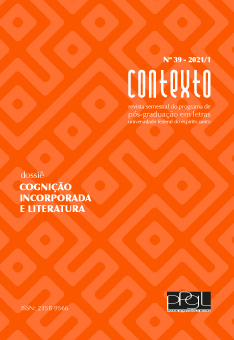Embodied cognition and autopoiesis in Don Quixote
Resumo
ABSTRACT: Human beings are animals, and therefore a concept of cognition as embodied, together with tools such as Theory of Mind and Theory of Body, should inform all literary study. We read Cervantes’ novel thinking of and discussing characters such as Don Quixote and Sancho Panza as if they were real, embodied human beings. Their contextualized bodies, and our understanding of how they are thinking, are important throughout the work. We read literary characters as autopoietic biological systems. Autopoiesis (a living organism generates itself within its physical, historic, social, linguistic context) and the related concept of structural coupling (the dynamical interaction of body and context) are two important concepts from biology that help us understand the notion of embodiment and are of primary importance to literary scholars.
KEYWORDS: Autopoiesis. Don Quixote. Embodiment. Literary characters. Theory of Mind.
Downloads
Publicado
Edição
Seção
Licença
Copyright (c) 2021 Howard Mancing; Brunella Martinelli de Medeiros Fiuza, Christiane Fontinha de Alcantara

Este trabalho está licenciado sob uma licença Creative Commons Attribution-NonCommercial 4.0 International License.

Este obra está licenciado com uma Licença Creative Commons Atribuição-NãoComercial 4.0 Internacional.





